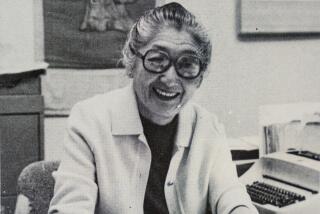Blanche E. Seaver, Major Donor to Colleges, Dies
- Share via
Blanche E. Seaver, philanthropist and major supporter of such California institutions of higher learning as Pepperdine University, USC and Pomona College, has died. She was 102.
Mrs. Seaver, who was also a composer and pianist, died Saturday in the Los Angeles home where she had lived for 67 years, Pepperdine spokesmen announced Tuesday.
The widow of wealthy oilman Frank R. Seaver, she founded the liberal arts college named for him at Pepperdine and over three decades became the most generous donor in Pepperdine’s history. In 1975 she received a lifetime appointment to the university’s Board of Regents and in 1980 she received an honorary doctorate from the school.
“Mrs. Seaver’s generosity and magnanimous support made our Malibu campus possible,” said Pepperdine President David Davenport. “She had the foresight to invest in a small campus that has become a prestigious institution of higher learning.”
Her philanthropy also benefited USC, Pomona College, Loyola University, Mount St. Mary’s College, Don Bosco Technical Institute, Rockford College in Rockford, Ill., and Los Angeles’ Harvard and Pilgrim schools. She served on Pomona’s Board of Trustees and received an honorary degree from USC. For her philanthropy and work with charitable and arts organizations, Mrs. Seaver was honored in 1963 as a Los Angeles Times Woman of the Year.
Born Blanche Ebert, the 10th child of poor Norwegian immigrants in Chicago, she was a musical prodigy who taught piano by age 6. She was trained at the Chicago Music School and came to Los Angeles to work as a teacher and voice coach at the Egan School of Drama and Music.
She first encountered Seaver, then a lawyer who drafted the Los Angeles County Charter, when they were riding on a streetcar in Downtown Los Angeles. They were married Sept. 16, 1916.
While he was serving in the Navy during World War I, she wrote her most famous song, “Calling Me Back to You.” She also composed music for the prayer “Just for Today,” and Irish tenor John McCormack made both songs famous.
In 1919, Mrs. Seaver did a special arrangement of “The Battle Hymn of the Republic” that was performed by the Philadelphia Symphony Orchestra at a memorial concert conducted by Leopold Stokowski in honor of President Theodore Roosevelt.
The Seavers, who had no children, began their youth-oriented philanthropy in the 1920s when they lived in Mexico where he directed oil drilling operations. They founded an orphanage in Mexico City.
After they returned to Los Angeles in 1927 and moved into their house in the Edward L. Doheny compound that is now the Mount St. Mary’s College campus, Mrs. Seaver co-founded the Los Angeles Orphanage Guild. She also was a founding member of the Social Service Auxiliary and the board of directors of Childrens Hospital, which received many of her donations over the years.
A patroness of the arts, Mrs. Seaver contributed heavily to the Los Angeles Music Center and was active in the Los Angeles Symphony and Hollywood Bowl associations, the Symphony Patroness Committee, the Nine O’Clock Players of the Assistance League, and in Las Madrinas, whose debutante teas she regularly hosted. The Los Angeles Pops Orchestra dedicated its inaugural concert to her.
Mrs. Seaver, outspoken in her conservative politics, regularly wore a jeweled American flag pin on her left shoulder and displayed autographed pictures of Republican presidents beside those of musicians in her home.
Mrs. Seaver is survived by three nephews, Earl Spencer of Hillsborough, Calif., Theodore Spencer of Sacramento, and Richard Carlton Seaver of Los Angeles.
More to Read
Sign up for Essential California
The most important California stories and recommendations in your inbox every morning.
You may occasionally receive promotional content from the Los Angeles Times.










